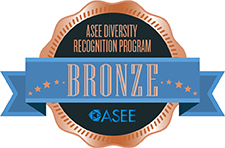The American Society of Engineering Education (ASEE) honored the UH Cullen College of Engineering with an award recognizing its commitment to diversity and inclusiveness.
The college is one of 74 engineering programs around the country that received a bronze-level designation as part of ASEE’s national Diversity Recognition Program, which launched this year. Bronze was the only level designated during this inaugural award cycle.
Founded in 1893, ASEE is a nonprofit organization committed to furthering education in engineering and engineering technology. Its new program is the first national effort to publicly recognize engineering schools for their contributions to building a diverse workforce.
“This award from the ASEE is a great honor and it signifies that the Cullen College of Engineering is among the nation’s leaders in inclusive excellence,” said Joseph Tedesco, Elizabeth D. Rockwell Dean of the college. “We have a well-established tradition of encouraging diversity and inclusion at the college and our goal is to keep building our successes.”
Previously, the Program for Mastery in Engineering Studies (PROMES) at the Cullen College won two consecutive awards from INSIGHT Into Diversity, the largest and oldest U.S.-based diversity and inclusion magazine and website in higher education. PROMES, established in 1974, received a 2018 Inspiring Programs in STEM Award and Jerrod Henderson, director of PROMES, was honored with a 2017 Inspiring Leader in STEM Award.
In addition to PROMES, the Cullen College offers an array of outreach programs aimed at inspiring underrepresented groups to enter STEM fields. Two such programs – G.R.A.D.E. (Girls Reaching and Demonstrating Excellence) Camp and Girls Engineering the Future (sponsored by Chevron) – focus on encouraging young girls to pursue careers in engineering. The St. Elmo Brady STEM Academy, an innovative after-school program focuses on young, underrepresented male students.
Researchers at the Cullen College track the impact of these programs annually, reporting that a much higher percentage of the participants go on to study STEM fields in college when compared to their peers.
As of fall 2018, around 25 percent of the Cullen College’s undergraduates are women; 23 percent of enrolled undergraduates identify as Hispanic; and 4 percent as Black.
While the college is proactively supporting diversity and inclusion, national numbers show that despite progress being made certain groups – African Americans, Hispanics and Native Americans – continue to be underrepresented among those earning science and engineering degrees. White students earned about 59.3 percent of U.S. bachelor’s degrees in engineering in 2016, while Black or African American students earned 3.9 percent, Hispanics earned 10.4 percent and Natives only 0.3 percent, according to the 2019 Women, Minorities and Persons with Disabilities in Science and Engineering Report by the National Science Foundation.
Women’s share of degrees has only increased slightly at the bachelor’s and master’s level over the past two decades – 18 to 21 percent and 18 to 25 percent respectively, from 1997 to 2016. Although the number of women who received engineering doctoral degrees in 2016 is small (2,400), it represents a larger share: increasing from 12 percent to 24 percent from 1997 to 2016.
The University of Houston is a Carnegie-designated Tier One public research university. UH serves the globally competitive Houston and Gulf Coast Region by providing world-class faculty, experiential learning, groundbreaking research and strategic industry partnerships.
Located in the nation's fourth-largest city and one of the most ethnically and culturally diverse regions in the country, UH is a federally designated Hispanic- and Asian-American-Serving institution with enrollment of more than 46,000 students.
